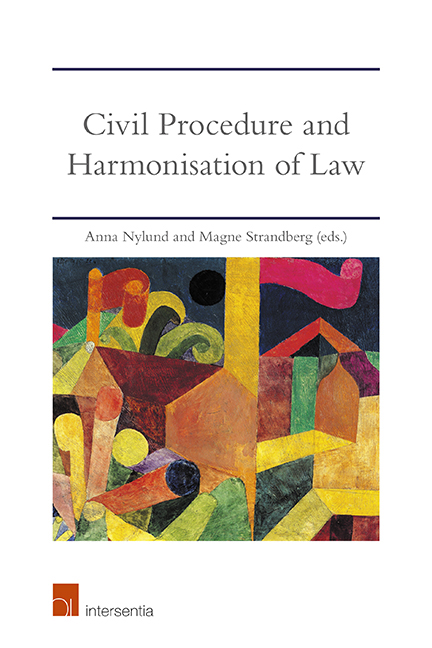Book contents
- Frontmatter
- Preface
- Contents
- List of Contributors
- List of Abbreviations
- Introduction
- EU Civil Justice at the Harmonisation Crossroads?
- The ELI-UNIDROIT Project: An Introduction and an English Perspective
- Europeanisation of Civil Procedure: Overcoming Follow-Up Fragmentation through Bottom-Up Harmonisation?
- Harmonisation or Fragmentation of National Law? An East Nordic Perspective
- An Examination of the Influence of European Union Law on English Civil Procedure
- The EU's Influence on Norwegian Civil Procedure through National Substantive Law
- Consumer Protection and EU-Driven Judicial Activism in the Netherlands
- The Role of the Judge in Consumer Cases – A German Perspective
- Ex Officio Application of the Unfair Terms Directive Cases against Consumers: A Swedish Perspective
- Ex Officio Application of EU Consumer Protection Law in Norwegian Courts
- Maintenance and Multi-Level Harmonisation: A European Union Perspective
- Family Maintenance and Multi-Speed Integration: A Norwegian Perspective
- Conclusions on Civil Procedure and Harmonisation of Law
- About the Editors
The ELI-UNIDROIT Project: An Introduction and an English Perspective
Published online by Cambridge University Press: 30 March 2019
- Frontmatter
- Preface
- Contents
- List of Contributors
- List of Abbreviations
- Introduction
- EU Civil Justice at the Harmonisation Crossroads?
- The ELI-UNIDROIT Project: An Introduction and an English Perspective
- Europeanisation of Civil Procedure: Overcoming Follow-Up Fragmentation through Bottom-Up Harmonisation?
- Harmonisation or Fragmentation of National Law? An East Nordic Perspective
- An Examination of the Influence of European Union Law on English Civil Procedure
- The EU's Influence on Norwegian Civil Procedure through National Substantive Law
- Consumer Protection and EU-Driven Judicial Activism in the Netherlands
- The Role of the Judge in Consumer Cases – A German Perspective
- Ex Officio Application of the Unfair Terms Directive Cases against Consumers: A Swedish Perspective
- Ex Officio Application of EU Consumer Protection Law in Norwegian Courts
- Maintenance and Multi-Level Harmonisation: A European Union Perspective
- Family Maintenance and Multi-Speed Integration: A Norwegian Perspective
- Conclusions on Civil Procedure and Harmonisation of Law
- About the Editors
Summary
There is a long tradition of civil procedural reform in Europe. In England and Wales (England), for instance, a fetish is made of reform. It is embarked upon approximately every ten years. Equally, there is a long tradition – although perhaps not one that has always been carried out consciously – which has seen national civil procedural systems across Europe converge. As Stürner noted in 2004,
England is the motherland of the common law and common law procedure, but the [Woolf reforms of 1999] bring English civil procedure closer to the Continent and indicate a remarkable convergence between the different systems.
To a common lawyer, the view from England would be much the same. Convergence across systems has been a feature of the recent procedural past. Notwithstanding such convergence as there has been, there have been few conscious attempts to produce common principles of European civil procedure, unlike, for instance, attempts to articulate common principles of European contract law. There have been equally few attempts to produce a common code of civil procedure for Europe. In this chapter, one such attempt, the most recent one, to develop a common code of civil procedure for Europe is examined. That attempt is the project, entitled ‘From Transnational Principles to European Rules of Civil Procedure’ (hereafter referred to as ‘the project’), being carried out jointly by the European Law Institute (the ELI) and the International Institute for the Unification of Private Law (UNIDROIT). In particular, the project's background, methodology and early influence is examined. Finally, its potential future effect on both national and European Union civil procedure is considered.
BACKGROUND TO THE PROJECT
The project formally began in October 2013 via an initial exploratory workshop. Three factors lay behind its inception. The first was the lack of any principled progress, noted above, in the development of a common European Code of Civil Procedure. There is a suggestion – and it can be put no higher than that – that Sir Jack Jacob, England's leading civil procedural scholar from the 1960s until the end of the 1990s, attempted to devise a ‘uniform procedural code’ for the then European Common Market in the 1970s.
- Type
- Chapter
- Information
- Civil Procedure and Harmonisation of LawThe Dynamics of EU and International Treaties, pp. 35 - 60Publisher: IntersentiaPrint publication year: 2019



